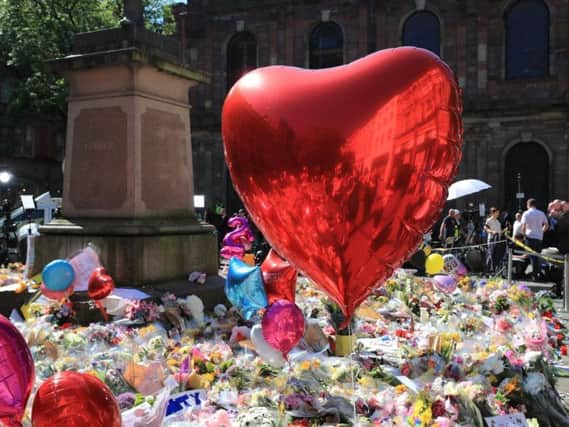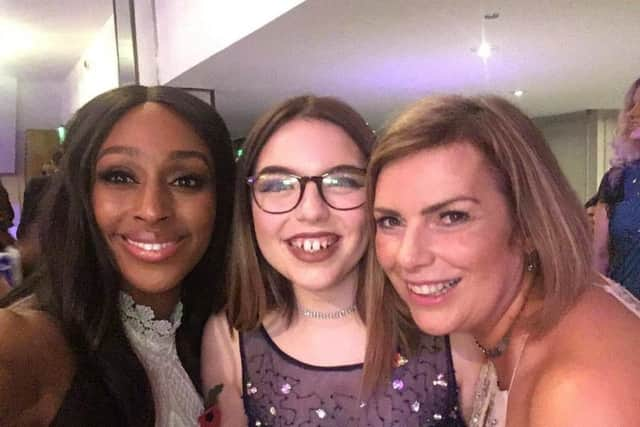Manchester bomb victim 'I couldn't cope with the trauma and I couldn't find any help'


Ruth Murrell, of Ribble Valley, was at the Ariana Grande concert with her 13-year-old daughter Emily and her best friend Michelle Kiss.
Mother-of-three Michelle, who lived in Whalley, was killed in the attack while Ruth and Emily were both badly injured.
Advertisement
Hide AdAdvertisement
Hide AdThey spent six weeks in the Royal Manchester Children’s Hospital after the attack - between them having 10 operations to remove shrapnel from their bodies.


But despite the seriousness of her injuries, it was the trauma that she found most difficult to cope with - and even more difficult to access any support.
"I felt bereavement, I had lost my friend Michelle and then guilt, I didn't know why I had survived and she hadn't.
"Then I began having horrific flashbacks, in a trauma situation your mind acts like a camera and take pictures of things. I saw some horrendous things and I had three scenes that I would see again and again and again. I couldn't sleep and if I did sleep I would wake up in the morning and be reminded all over again.
Advertisement
Hide AdAdvertisement
Hide Ad"Then there was the anxiety, I felt in a constant state of high alert, I was nauseous all the time and I was too frightened to leave the house. I didn't want to go anywhere, I couldn't face crowds or even the supermarket and I didn't want to be with anyone.
"At my worst I just stayed in bed and didn't talk to anyone. I felt terrible guilt about my daughters, my elder daughter would come up to my room and see me but I couldn't even talk to her."
Ruth's younger daughter Emily, now 14, was at the Arena that night and also struggled to cope in the aftermath.
Ruth said: "Emily became very withdrawn, she didn't want to talk, to see her friends and watch TV, she just stayed in her room.
Advertisement
Hide AdAdvertisement
Hide Ad"But I felt so bad I couldn't even help her. At my lowest ebb one day I was so desperate I just thought 'I've got to put a end to this'. And then I felt such guilt that my daughters had been through so much already."
Hitting rock bottom inspired Ruth to go to her GP and try to get professional help, but when she tried to access help, she found herself hitting a brick wall.
She said: "I went to my GP and he was lovely, he referred me for professional help and counselling straight away, but he also warned me that there was a 9-12 month waiting list. He said he was so, so sorry but there was a long wait.
"The same happened when I tried to access help for Emily, she was given her initial appointment in October - 6 months after the attack - ad her treatment didn't start untl February, almost a year after."
Advertisement
Hide AdAdvertisement
Hide AdRuth was so desperate for help that in the end she paid for private counselling.
She said: "I used my money from the Manchester Fund to pay for help and I'm so lucky I had that, because otherwise I could definitely not have afforded £85 a week for counselling. But I couldn't go on as I was.
"And once we started getting proper help, both Emily and I improved so quickly. Post Traumatic Stress Disorder is treatable, but it needs proper professional help to use techniques like cognitive behavioural therapy and eye movement therapy.
"Everyone that I met within the system was lovely and really wanted to help, but there just weren't enough people within the system who had the right qualifications.
Advertisement
Hide AdAdvertisement
Hide Ad"Emily had some help from Lancashire Nest (Victim Support) and they were great, but they said themselves that they are not trained counsellors and that is what Emily needed."
The pair are now on the road to recovery, although it will be a long process.
Emily was out of school three and a half months, but is now back and doing well.
And Ruth has begun working with the charity Survivors Against Terror, which advocates for better treatment for terror victims, as well as going in to schools to try and tackle extremism. She has been working closely with Brendan Cox, widower of MP Jo Cox, with the charity.
Advertisement
Hide AdAdvertisement
Hide AdShe said: "We are both getting better, although it is not a complete process. I still find crowds difficult and I haven't been able to go back to Manchester.
"Once I started getting the help I improved so much, but much more needs to be done to ensure that survivors of other attacks don't have to go through what we did, and are able to access help much, much quicker."
